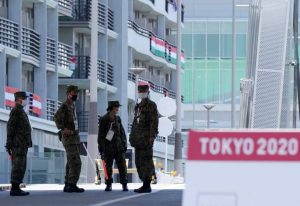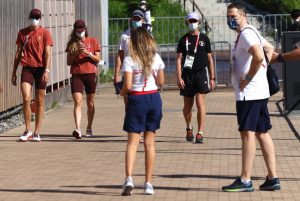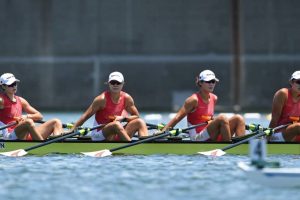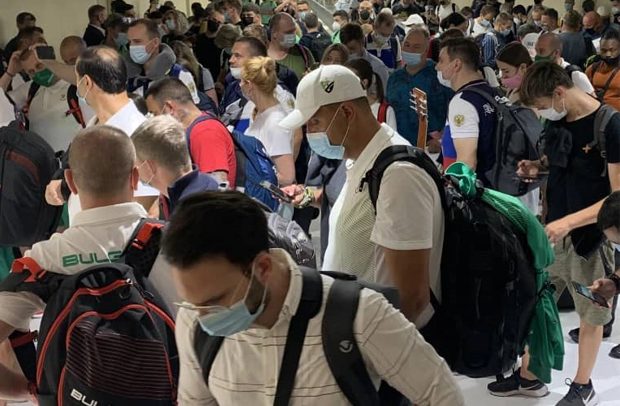With Olympic bubbles ‘broken’, health experts say safety measures at COVID-delayed Summer Games are neither adequate nor properly enforced.
At least 91 people accredited to the Olympics have now tested positive for COVID-19, while daily cases in Tokyo are currently at their highest in six months
But there is little excitement in the Japanese capital, where an estimated 85,000 people – including athletes, officials and reporters – are expected to converge for the global sporting event’s opening ceremony on Friday.

Refugee Olympic Team: Highlighting the voice of millions at Tokyo
Tokyo 2020: Olympics ceremony director fired over Holocaust joke
Australia’s Brisbane to host 2032 Olympic Games
WHO chief backs Tokyo Olympics days before opening ceremony
With the world still in the grip of the coronavirus pandemic and the Olympic host city in its fourth virus-related state of emergency, a largely unvaccinated Japanese public is worried the Summer Games could turn into a super-spreader event and overwhelm the country’s already strained healthcare system.
Adding to those concerns, at least 91 people accredited to the Olympics have now tested positive for COVID-19, while daily cases in Tokyo are currently at their highest in six months. The Japanese capital logged 1,979 new infections on Thursday.
Public opposition to the Games is so fierce that top corporate sponsor Toyota has pulled Olympic-themed advertisements from Japanese television, while a growing number of politicians and business leaders are shunning the Summer Games opening ceremony. Even Emperor Naruhito is said to be considering omitting the word “celebrating” when he formally declares the sport tournament open on Friday.
The International Olympic Committee (IOC), however, insists that the Games – where nearly all spectators, local and foreign, have been banned – will be “safe and secure”.
The for-profit sporting body, which stood to lose $3bn in broadcast rights if the Games were cancelled completely, said 85 percent of all athletes arriving in Japan are either vaccinated or immune and insists that its safety measures mean the athletes are “probably the most controlled population at this point of time anywhere in the world”.
‘Broken’ Olympic bubbles
The IOC’s COVID-19 playbooks state that Olympic visitors must have two negative test results in the 96 hours prior to their arrival in Japan and have another negative result on landing. They must also download location-enabled contact tracing apps on their phones and limit their movements while in the country to specific “bubbles”.
At Tokyo’s Olympic Village, which is hosting about 11,000 people, athletes are sharing rooms, but are undergoing daily coronavirus tests and being asked to wear face masks at all times – except when they are sleeping, eating or competing. Athletes who win gold, silver or bronze will also be asked to place their medals around their own necks, and those who complete their events are required to leave the country within two days of their last event.
Christophe Dubi, executive director at the IOC, described the sporting body’s rules on Sunday as “rigorous”, “thorough” and “very strict”.
“There is no such thing as zero risk,” he told reporters in Tokyo. “At the same time,” he added, “the mingling and crossing of the population is incredibly limited, and we can ensure that transmission between groups is almost impossible.”

Worries, however, are growing in Japan that the IOC’s measures are neither properly enforced nor adequate.
Japan Self-Defence Forces soldiers stand guard at the athletes’ village for the Tokyo 2020 Olympic Games, in Tokyo, Japan, July 22, 2021 [Naoki Ogura/Reuters]
Athletes and people wearing protective face masks arrive at Narita International Airport before the Tokyo 2020 Olympic Games [Amr Abdallah Dalsh/Reuters]
On Monday, the Mainichi newspaperreported “disarray” at airports receiving people accredited to the Olympics, “with some athletes coming close to general travellers and fans asking for autographs”.
The Asahi Shimbun also reported last week that several Olympic delegates stopped to take selfies and fist bump other passengers at the airports, adding that hotels in Tokyo were struggling to monitor the movements of those staying with them. Hotel workers are “exasperated by their supposed roles in maintaining the bubble around Olympic delegations”, the newspaper said, quoting one manager as saying, “It’s not even our job to begin with.”
Kenji Shibuya, a prominent Japanese health expert, said the IOC’s bubble system “seems broken” even before the formal start of the Games.

“The IOC playbooks are not perfect, and many visitors and delegates are not following the guidelines,” said the former director of the Institute for Population Health at King’s College London. He warned that the IOC’s inability to monitor the movements of tens of thousands of visitors – combined with the border authorities’ use of antigen tests, which have “a higher probability of false negatives when compared with PCR tests” – could worsen the spread of the highly transmissible Delta variant in Japan.
“The fundamental problem has been a lack of open, transparent and scientific discussion on the conditions under which the Olympics could be held in a safe and secure manner,” he said. “Japan is in its fourth state of emergency and the number of cases in Tokyo is increasing. Hospitalisation among those aged between 40 and 50 is also increasing. Globally, the Delta variant is spreading rapidly and the vaccine rollout is limited in many countries, including Japan – this is obviously not the right time to hold the Olympics.”
A majority of the Japanese public agree with that sentiment, while a staggering 68 percent of people surveyed by the Asahi Shimbun earlier this week also said they did not believe the Games could be held safely.
IOC ‘failed’
Annie Sparrow, assistant professor of health science and policy at the US-based Icahn School of Medicine at Mount Sinai, said the IOC could have avoided the “debacle now unfolding at the Tokyo Olympics” if it had listened to expert advice.
Sparrow, who reviewed the IOC’s playbooks in a study published in the New England Journal of Medicine, said the organisation settled for “cheap measures that don’t work rather than scientifically proven ways that do”. What the IOC recommends is based on an outdated understanding of how COVID-19 spreads, she said – that the illness is transmitted only by large droplets that fall to earth quickly rather than small particles that linger and spread in the air.
The IOC and local organisers must immediately set in place measures that limit aerosol transmission, including placing hospital-grade air filters or “HEPA filters in every hotel room, every venue, every transport vehicle, every cafeteria and every shared space”, she said.
Protesters gather before International Olympic Committee President Thomas Bach visits Hiroshima Memorial Cenotaph on July 16, 2021, in Hiroshima, western Japan. The banner in the centre reads: ‘Bach, Do not come to Hiroshima!’ [Nuga Haruka/Pool via AP]
Athletes must also be housed in single rooms and given proper face masks.
“Face coverings won’t protect them,” she said, adding that athletes should use filtering facepiece respirators, such as the N95 respirators, while in close-contact settings such as transport vehicles.
“Test everyone, not just the athletes, everyone in the village,” she said, expressing concern about what she called inadequate protections for Olympic workers. “And vaccinate all of the workers, all the volunteers, all the officials.”
What also worries Sparrow is that the Olympics could become a mega-spreader event globally. The IOC and local organisers must “do real-time genomic testing so athletes don’t unwittingly take a variant home to unvaccinated unprotected populations with variable or marginal healthcare infrastructure,” she said.
Less than 24 hours remain for the Summer Games opening ceremony, but many in Japan say it is still not too late to call the event off.
“There’s no way to hold an event like this safely,” said Satoko Itani, associate professor at Kansai University in Japan.
“The IOC had one year to prepare, they failed. So, cancellation is the safest way to go.”
She added, “People’s lives are on the line. And as a host country, our utmost responsibility is to protect people’s lives. At this point, the best we can do is to cancel this Olympics as soon as possible.”
Credit: Aljazeera


